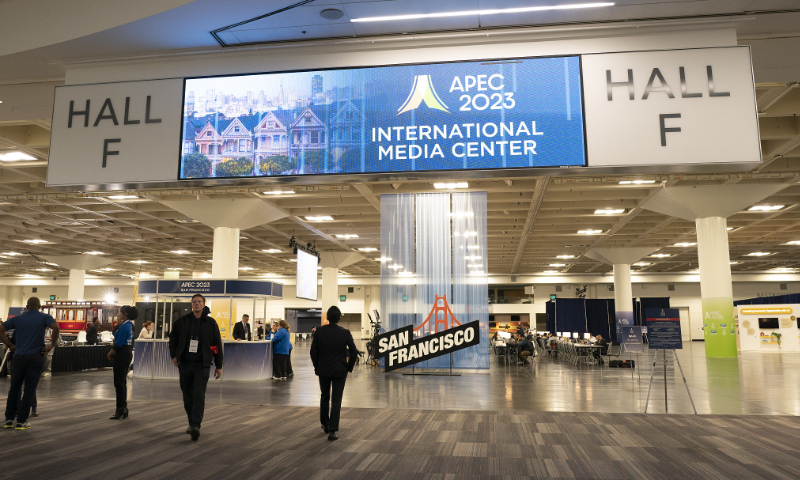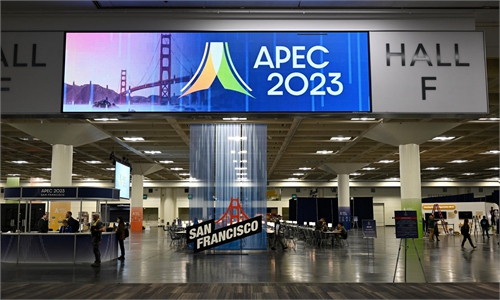
Journalists work at the international media center of APEC 2023 in San Francisco on November 12. Photo: VCG
The 30th APEC Economic Leaders' Meeting is set to officially kick off on November 15, local time. This marks the highlight of APEC Economic Leaders' Week. Leaders from 21 economies have already successively arrived in San Francisco, the US. As the highest-level, broadest, and most influential economic cooperation mechanism in the Asia-Pacific region, APEC has received fervent anticipation from the international community for this meeting. In essence, there is an expectation for dialogue, stability, and prosperity. At a time when the world economy is fervently seeking new development opportunities, the cooperation and development of the Asia-Pacific region profoundly affect the future and destiny of the world.
Before APEC Economic Leaders' Meeting, the organizers held a news conference on "APEC Regional Trends Analysis." The briefing repeatedly mentioned "geoeconomic fragmentation." In the Q&A session that followed, several media outlets focused on the economic risks brought about by "great power competition," such as protectionism and actions disrupting supply chain stability. There was also attention on whether the small circles, such as the Indo-Pacific Economic Framework for Prosperity (IPEF) promoted by the US, would lead to fragmentation and impact on APEC cooperation. These situations indicate that Washington's practice of "decoupling" in the past few years, which it continues to pursue, and its strategic thinking of "outcompeting China," have not only raised concerns in the international community but have also resulted in tangible damage. At the same time, the increasing attention to "geoeconomic fragmentation" reflects a growing strong desire for cooperation and development.
As the two largest economies in the world, China and the US together account for over 40 percent of the global GDP. The trajectory of their economic and trade relationship is not only crucial for the unity and cooperation of APEC but also holds immense significance for the entire world. Theoretically, the economic structures of China and the US are highly complementary, and their economic and trade cooperation is mutually beneficial and win-win, which should naturally lead to a better economic and trade relationship, generating greater developmental momentum for the world through bilateral cooperation. However, this cooperation is currently facing numerous countercurrent disruptions. Despite still demonstrating significant resilience, considerable potential is being overshadowed, making it difficult to fully unleash. This is a tremendous regret for both China and the US, as well as for the world. It is something that should not be the case.
It has to be said that the majority of these countercurrents are caused by disruptions from domestic political factors in the US, but "decoupling" is by no means the mainstream desire of the American society. A scene outside the APEC venue can illustrate this very well. In recent days, executives from large multinational companies such as Microsoft, Citigroup, and ExxonMobil flocked to San Francisco, hoping to have the opportunity to meet with leaders from various Asian countries, especially China. This desire is very strong, and the reason is simple: "They are ready to get back to business." What is the "business?" Obviously, it is to further strengthen cooperation and achieve win-win results. As Joseph Nye, an American political scientist and proponent of "soft power," recently said, China and the US need each other and cannot be separated. This is the common understanding and empirical conclusion of the two societies in China and the US.
APEC accounts for nearly 40 percent of the global population and nearly half of the global trade volume. US Treasury Secretary Janet Yellen also said that APEC members represent some of the fastest growing and most dynamic economies in the world, driving both growth and innovation. According to the latest forecast by the International Monetary Fund, the Asia-Pacific region is expected to contribute about two thirds of global growth this year, and this proportion will continue to be maintained. This is hard-won and deserves to be cherished and protected. We have noticed that during the APEC meetings, some politicians in the US are still promoting the Cold War mentality of a "zero-sum game." A group of 22 Senate Republicans issued a joint statement, urging US President Joe Biden "not to make any concessions," and stating that the US should not "throw any sort of economic lifeline" to China. This claim is ridiculous and represents the narrow-mindedness and ignorance of these individuals. US decision-makers need to remain clear-headed amid these noises and distractions.
In the meeting between the leaders of China and the US in Bali last year, President Xi Jinping emphasized that the world is big enough for the two countries to develop themselves and prosper together. President Biden also promised that the US has no intention to seek "de-coupling" from China, to halt China's economic development, or to contain China. We look forward to the US side meeting the Chinese side halfway, and hope that as the host country of the APEC meetings, the US could cherish and make good use of this opportunity to promote China-US relations to return to a healthy and stable development track, and make the necessary contributions as a major country to the peace, stability, and prosperity of the Asia-Pacific region.


